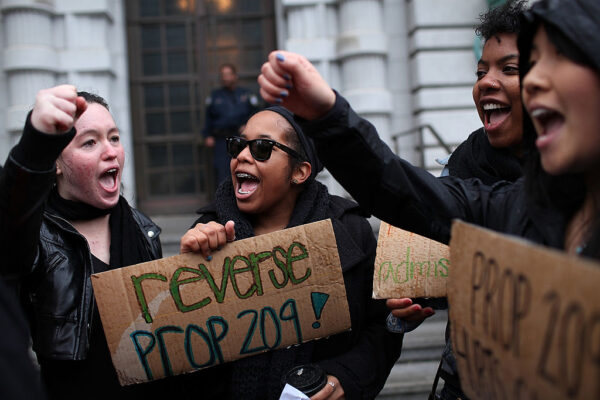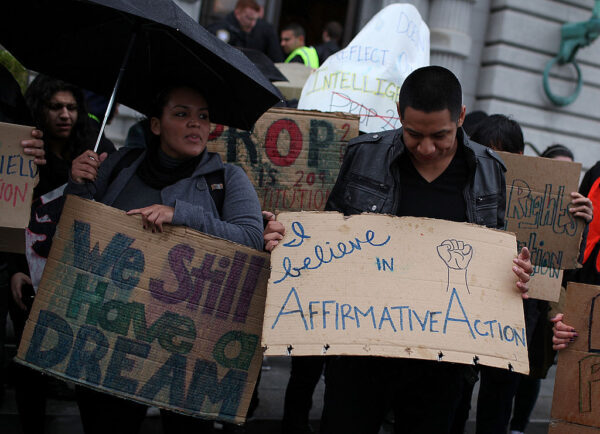
A new amendment to Californias constitution would permit using race and gender as factors for college admissions, government hiring, and government contracting.
Proponents hope it will allow for hiring and admissions that support disadvantaged groups. Opponents say it could result in discrimination, and they urge for other methods of supporting the disadvantaged.
Assembly Constitutional Amendment 5 (ACA 5) would undo 1996s Proposition 209—which prohibits the state from discriminating against, or granting preferential treatment, on the basis of race, sex, color, ethnicity, or national origin.
“The ban on race-conscious and gender-conscious remedies do not allow for us to deal with root causes of systemic failures,” ACA 5s author, Assemblywoman Shirley Weber (D-San Diego), said when she introduced the legislation.
“California is out of step with 42 other states, being only one in eight states with this ban.”
“The removal of 209 would not burden you, because it is permissive and not prescriptive and does not mandate anything,” she said. “But for leaders who want to help remedy gender bias and disparity, Proposition 209 has only served as an impediment to act on best practices aligned with the United States Constitution.”
If the amendment passes the state Senate on June 25, it will go onto the November ballot for Californians to decide.
It has support from over a hundred various organizations and entities, including the American Civil Liberties Union California, Chinese for Affirmative Action, and the California Faculty Association. But it also has vocal opponents.
A No Vote
Assemblyman Steven Choi (R-Irvine) voted “no” on the resolution before it passed the Assembly on June 10.
“I felt that [ACA 5] was against the spirit of America and Democracy in that we pursue the equality for everyone regardless the race, color of skin, national origin, sex, religion, or whatever,” he told The Epoch Times. “Proposition 209 was passed by Californian people to break those differences or barriers for the equal opportunity for everyone.”
“America is the land of opportunity based on your desire, effort, hard work, and ability,” he said. “Anyone can realize the American dream if you try to achieve it. Thats the reason why so many people of the world immigrate to the United States. Among them, many do achieve the dream. I am one of them. I had only $50 in my pocket when I landed here.”
According to Marc Ang, president of the Chinese American Citizens Alliance, Orange County lodge, the current “system is working as it should.”
“What we need to do as a society is try to create a field of equal opportunity, not equal outcomes. And college is an outcome,” he told The Epoch Times.
“So we need to drill down to the actual things that would create the opportunity for other minority groups to get into college. And that really is through those prep programs, through mentorship, through working with nonprofits and non-governmental organizations, to uplift the African American, Hispanic American communities. Im all for that,” he said.
“The solution is not to enforce quotas,” he said.
Groups who oppose ACA 5 argue that allowing race and gender to be factors for employment and school admissions detracts from relevant merits and fosters discrimination.
A joint statement released by the Organization for Justice and Equality reads, “Everybody should be judged objectively based on merits including accomplishments, talents, dedication, and integrity, but not on immutable traits such as ethnicity/national origin or gender.”
The statement refers to a 2019 Pew Research Center survey that determined 73 percent of Americans said colleges and universities should not consider race or ethnicity.
Seventy-eight percent of white adults, 65 percent of Hispanics, 62 percent of black people, and 58 percent of Asians who participated agreed that race should not be a factor.
A 2011 study from Duke University found that minority graduation rates in the University of California (UC) system increased after the ban on affirmative action. An analysis of all UC applicants and enrollees found “that Prop 209 led to a more efficient sorting of minority students.”
Frank Lee, president of the Organization for Justice and Equality, told The Epoch Times, “Real equality means that we all be treated equally. Thats equality. Otherwise, it is inequality.”
Lee cited a quote by Martin Luther King, Jr., that is often cited by opponents of ACA 5: “I have a dream that my four little children will one day live in a nation where they will not be judged by the color of their skin but by the content of their character.”
That quote has spawned some controversy in recent years, taking on a kind of Rorschach quality.
For Lee, Kings quote illustrates the ultimate goal for progress. But for Victoria Dominguez, education equity director for Asian Americans Advancing Justice, Los Angeles, the quote is being misunderstood.
“Every time I hear that quote being misused, I have like a little physical reaction of cringing because its such a scapegoat to the realer issue, which is we cannot fix something or address something that youre telling me you dont see,” she told The Epoch Times.
Calls to See Race, to Recognize Racism
Dominguez sees racism as “a systemic issue that … bleeds into all of our institutions and we need to be able to address it in all our institutions by being able to first acknowledge [it].”
The concept of systemic, or “institutional,” racism gained traction through Stokely Charmichael and Charles V. Hamiltons 1967 book, “Black Power: The Politics of Liberation in America.”
The authors draw a distinction between individual racism and institutional racism. As examples, they write that the former is responsible for “white terrorists bomb[ing] a black church,” but the latter is responsible for “five hundred black babies [who] die each year” in Birmingham, Alabama, “because of the lack of proper food, shelter and medical facilities.”


“We need to be able to acknowledge it,” Dominguez said. “We need to be able to study it, you need to be able to address it, in order for us to get to the point where its no longer an issue.”
Angie Barfield, president emeritus for Black Students of California United, told The Epoch Times that “there needs to be a leveling of the Read More From Source
[contf] [contfnew]


